
Mizzou Director of Sport Psychology Hosts Positive Coaching Session at Heckart Performing Arts Center
By BOB SATNAN Sedalia 200 (SEDALIA, Mo.) - Putting students ahead of the scoreboard was the message Friday morning (Aug. 2) during a professional development session for Sedalia School District 200 coaches and activity sponsors.
Rick McGuire, director of Sport Psychology at the University of Missouri, delivered messages as part of the Missouri Institute for Positive Coaching, which he founded. McGuire, who was head track and field coach at Mizzou for 27 years, was joined by Brian Zuleger, a graduate assistant at the institute and an assistant coach for Mizzou’s cross country and track and field teams, and Bobby Low, also an institute graduate assistant and a four-time NCAA finalist in the pole vault.
“I like sport. I don’t like what sport has become in our society,” McGuire told the audience gathered in the Heckart Performing Arts Center. “We have a society that really has become intoxicated by sport. It’s gotten way overblown and it has distorted some important values in our society, and that concerns me.”
He encouraged coaches to take stock of what matters most to them and infuse that into their work with young athletes. He also said that it is okay to want to win, but other things are more important.
“What do you value? Because what you value should be deriving what your philosophy is – your philosophy of living, your philosophy of teaching, your philosophy of coaching defines how you go about doing what you do each day,” he said.
McGuire said his experience with an abusive coach put him on “a 45-year mission to find a better way.… If you are going to be loud, be encouraging. There are about 15,000 words in the English language; only about six of them are bad ones. Try using the other 14,996, not those six.”
Zuleger went over some of the work of Dr. Martin Seligman, a pioneer in the field of positive psychology. Zuleger said it is important for coaches to build opportunities for athletes to make decisions and stressed students’ need to feel competent if they are to succeed; allowing athletes to do what they are good at while working to improve other areas will bring more positive results, he said.
Low broke down the acronym PERMA – positive emotions, engagement, relationships, meaning and achieving, which he said is “not just winning games. Are you getting better? Are you mastering skills? As coaches, we influence this. We help kids feel and experience this.”
Heather Clancy, Smith-Cotton High School girls tennis coach, said the session “reinforced that the kids are the most important part, building relationships with them. It’s important to win, but it’s more important for the kids to be happy, having a good time.”
Clancy believes the Sedalia 200 district has “a great group of coaches who do these kinds of things already.” But there is an inaccurate perception among some students about how coaches interact with athletes.
“I think a lot of kids are scared,” she said. “Kids tell me they are kind of scared of me because I am a coach. I think a lot of people think coaches are too demanding and that they don’t care about the kids, but I think if kids were more aware that we are there for them, that we care more about them than we do winning, then more of them might get involved.”
McGuire said the best way to win games is to “win the kid first.”
“It does matter that we win in the life of every athlete that we have the opportunity to coach,” he said.
The following story was provided by Bob Satnan, Communications Director of Sedalia School District 200.
More From AM 1050 KSIS









